Part 1
About own and foreign paths
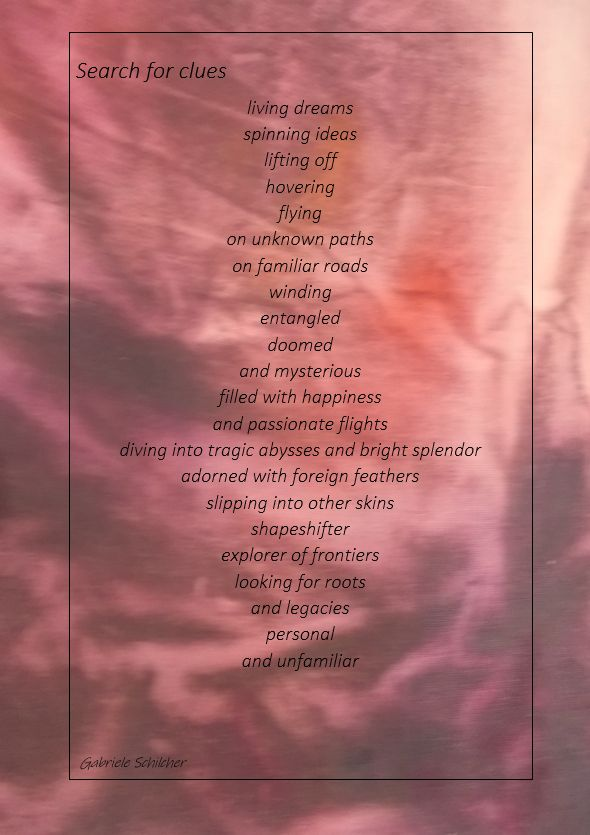
Fate was kind to me: I was born into a wonderfully creative environment! Unlike me, my mum grew up in a house with a garden. She comes from a family of tailors and my enthusiasm for textiles, for fabrics, fibers and drapery is probably a legacy of this ancestral line. Although — this exact, neat sewing according to pattern and templates, which my ancestors mastered it so skillfully and the basics of which I had learned at school, was never mine — but more on that later... My great—grandfather's small tailor's workshop, which I unfortunately only got to know as a child as a garden shed and storage space for furniture and deckchairs, was at the back of the garden between berry bushes and old fruit trees, right next to the pigsty and chicken coop. How I would have liked to see all this with my own eyes! My mother often told me how my great- grandfather's customers would salute the Mr. Tailor who made such great tailored suits, meeting him in the street - especially those who owed him!
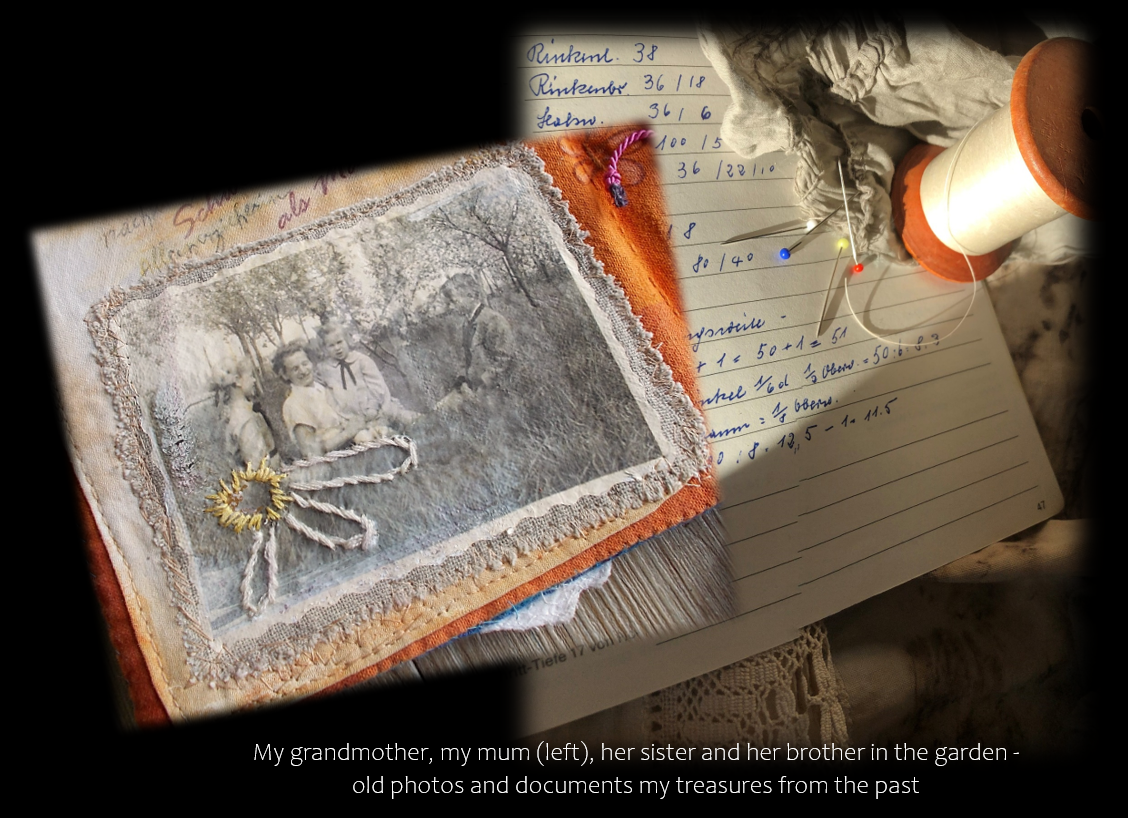
As often as possible we walked to this wonderful cottage where my grandmother lived, on paths that were still quiet and overgrown with greenery, and it was always fun for us children to first check the floor of her living room for lost needles — only then we could safely run around and play. I can still see her amused smile in my mind today when I go on this same search for needles in my studio! My dad, on the other hand, who was denied the dream of becoming a stonemason or even a sculptor in the post—war period, was occupied with artistic creation all his life, but without appearing in public with his wonderful woodwork and pictures. When I was a girl, I discovered with amazement and admiration an illustrated book about Auguste Rodin on his bookshelf — my first encounter with Camille!
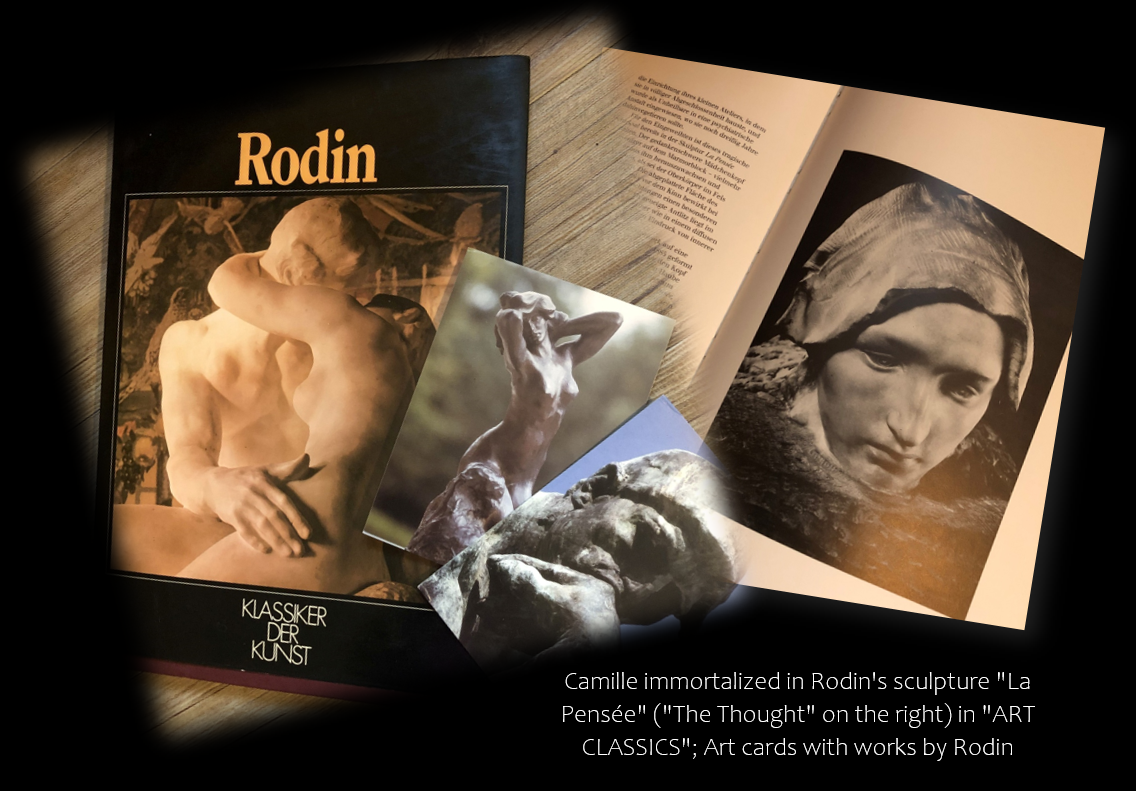
More than 40 years later on the search for an inspiring female artist for “Fearless, female artist in history” her name comes back to me again, puts me under its spell — Camille, she is the perfect choice, no one else can be! The internet makes the research I love so much easy — I read everything I can about her, study her now famous works and the film adaptation with a star cast. I immerse myself in Camille's world, follow her footsteps, the single—minded footsteps of a young, highly talented artist who courageously follows her vocation at the turn of the century. Her expressive sculptures were to remain in the shadow of the famous master Auguste Rodin, with whom she shared a passionate but ultimately unhappy love affair. She was just 19 years old when she met the much older sculptor. For around 14 years she worked at his side as a muse, model, lover, collaborator on his sculptures and independent artist who fought for recognition in the male-dominated domain.
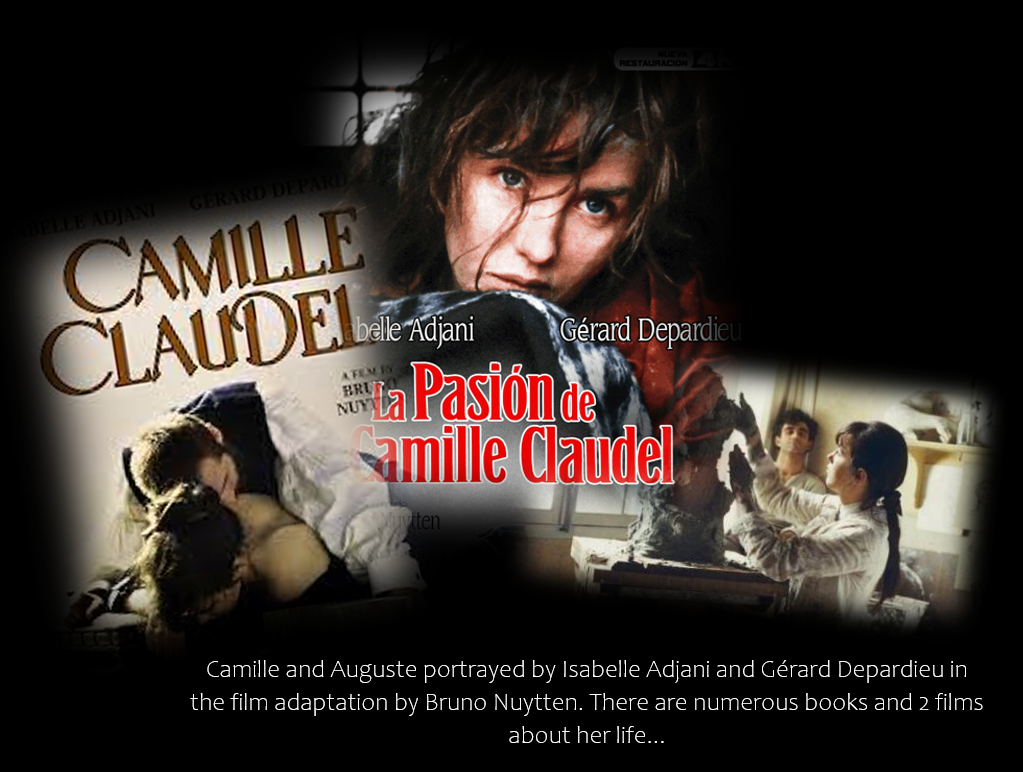
Driven by the desire for appreciation and equal treatment, she gives Rodin, who is officially in a relationship with Rose Beuret, a choice — but he opts for the socially recognized relationship with the older, long— term partner. A decision that plunges Camille into deep despair. Heartbroken, she loses herself, flees into her work, into isolation and alcohol. About a year later, after the death of her father, who always believed in her and supported her artistic talent financially, her mother had her unloved, scandalous daughter forcibly committed to an institution for the mentally ill. Camille writes pleading letters to her family begging for freedom and release — she dies after an unimaginable 30 years of internment from starvation, cold and a stroke buried in a mass grave! Only much later her works will be appreciated, only much later she will receive the admiration and recognition she so longed for...
Part 2
Light and Shadow
I get goose bumps when I read about Camille's fate, goose bumps and an oppressive feeling in my throat. As always, a first scribbled sketch on paper is created: My textile work should show light and shadow — the shimmer, her talent, the love, the despair, the break and the alienation from herself. Her sculptures, her great works should be part of the whole: - the “Bronze Bust of Rodin”, in the shadow of which her portrait is supposed to stand. - “The Waltz”, the dancing couple, an epitome of passion and harmony - “The Implorer”, Part of the figural group created after the break with Rodin Painted or needled in wool - that's the plan... Old photos are hard to find: the same image of Camille aged 19 (or 20?) captured by the photographer over and over again in a soft, blurry black-and-white shot. She appears proud and purposeful in this photograph, her chin pointed forward confidently, but there is also something delicate and fragile that can also be seen in the sparse, other pictures.
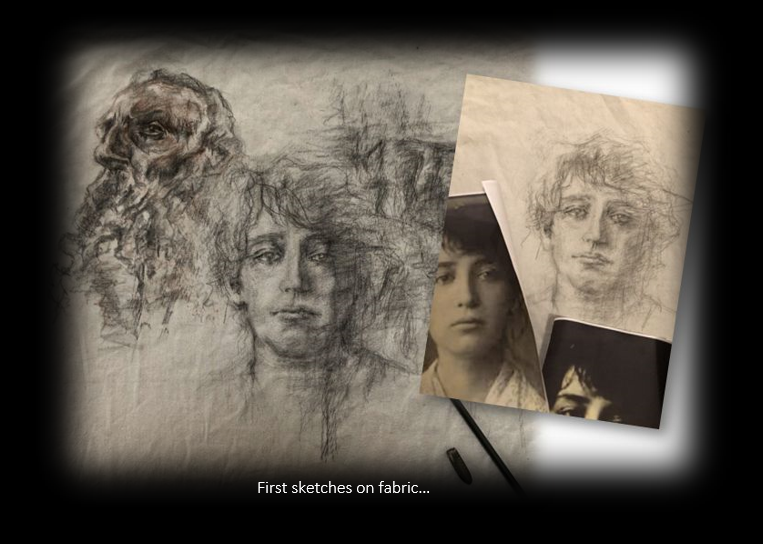
She is so young, almost still a girl, dressed in the obedient, high-necked women's clothes of her time, her long hair tied tightly together with bows. The adapted “outside” doesn't seem to fit in with her inside, her strong, free spirit. I can't help it, I have to loosen the hair a bit, let go of the strict collar... It is difficult to portray from such old photographs, the lines are soft and disappear. I wonder to what extent this picture is an expression of her true personality? What is truly her - what is just part of this snapshot arranged by the photographer? Sketches, shadows and accents are created on fabric with natural materials - a bit of fabric color can also be used later to create effects. Remnants of fabric find a place and are taken away again: old curtain fabrics, leftover cotton, silk, plant-dyed fabrics from past summer days, jute and velvet. I love recycling old, used things! Gradually one or the other asserts itself and the composition takes shape. Sometimes I curse myself for the ideas that seem so brilliant at first, which inspire my spirit and then present me with almost insurmountable tasks, but I always persevere and finally get it done - persistence and perseverance, two of my “best” (?) characteristics. To felt the sculptures, you need as many images as possible from different perspectives.
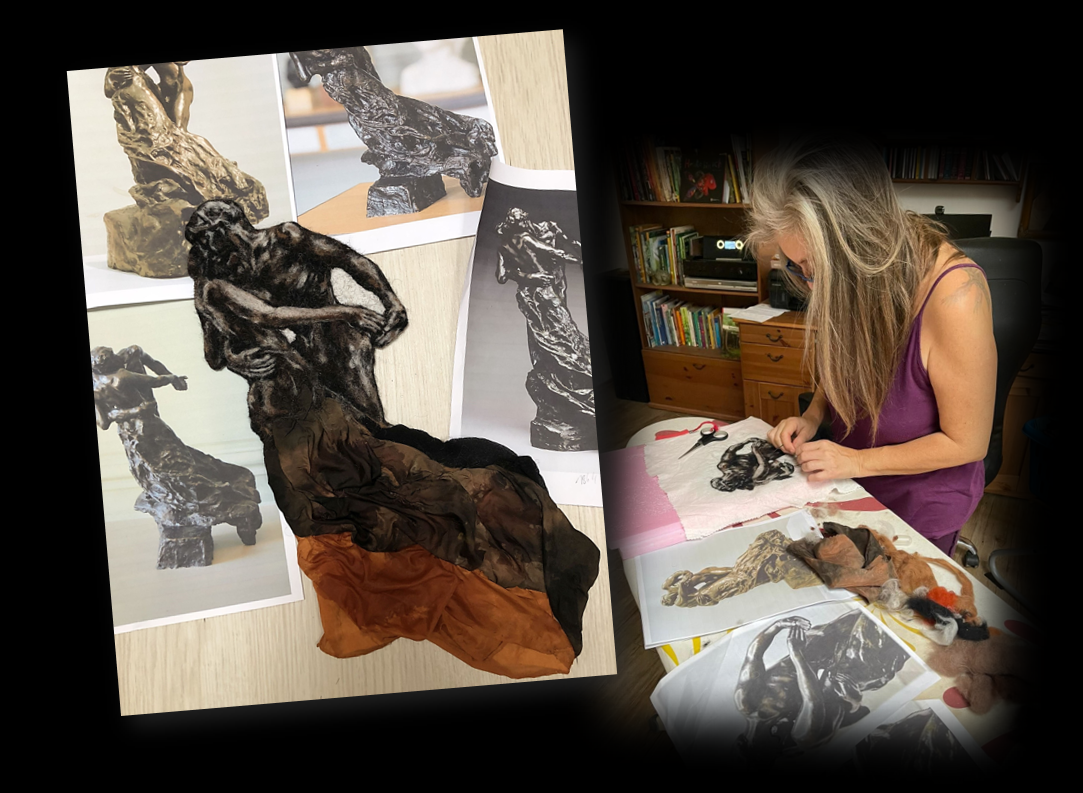
First needled, then wet felted and carefully cut out, they find their place on the large cloth. Texts on fabric, a sentence in Camille's original handwriting from one of her letters in French in a foreign language I don't speak - it seems right to me. Someday I want to learn it, a long-cherished resolution! Someday explore France, which strangely attracts me... One thing is slowly getting added to the others. So much experimentation - what if painting on fabric creates creases in the wrong places? The sewing machine gives up and I sew many, many parts by hand, centimeter by centimeter. Actually I like that! As I said, sewing work based on patterns and templates is not really my thing and no matter how exciting free sewing without a feed dog or guide is, what I prefer most is doing my own manual work without any machines or equipment, just a needle and thread, just a brush and paint, just paper and pen.
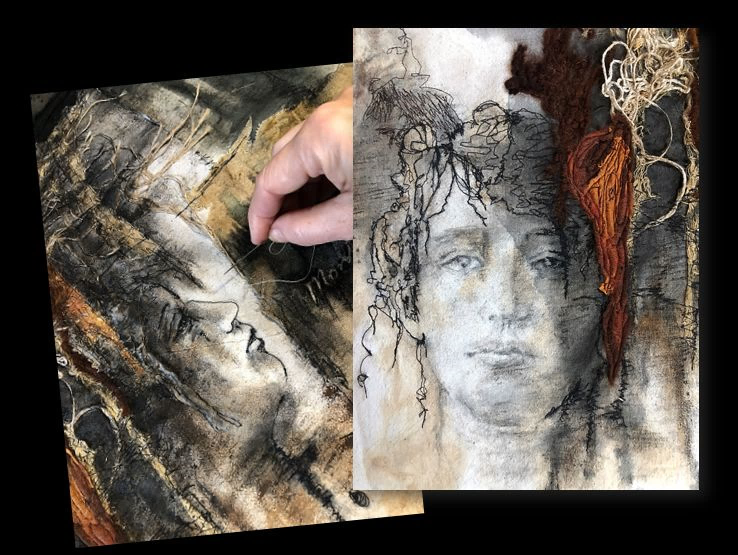
Working in this way feels like climbing a high mountain: the planning phase is full of enthusiasm and inspiration, the path is hard-won step by step. Arriving at the summit, a brief, violent feeling of happiness, endless exhaustion and later a slight regret because everything is already done. I'm rarely really satisfied with the result - always this critical look! But this time the journey will continue...
Part 3
Verona here we come
April 28th is getting closer and closer, the excitement and anticipation growing hand in hand with the usual “travel prep stress” — so much to take care of when we are not home: writing lists for the grandparents, who are taking care of animals and our home while we travel south... We usually go on relaxing vacations, in some wonderful place - mostly by the sea - enjoying, having a good time, exploring nature, getting pampered, and then return strengthened and longing to be back at our own green paradise. Everything is different this time: a city trip, exhibitions, adventures! Although I grew up in the city, as a child I spent every free minute with my parents in the countryside. Like Camille, who grew up in Villeneuve-sur- Fére in the Campagne and loved the ancient rocks on the Hottée du Diable above all else, I also love old places of power that tell stories. The enchanting city center of Verona with its southern flair has a lot to tell and is worth more than just one trip! Really narrow streets with beautiful, old, partly colorful house facades, small brick balconies with stone columns or forged railings, from which green plants grow upwards or hang down, historical buildings decorated with life-size sculptures.
Sometimes you just want to stop and go around in circles, look, marvel, discover and admire, which admittedly is not that easy, because at least on this long weekend in early May, Verona is also a city overrun with tourists: an unbelievable amount of people from all over the world, so many dogs of all breeds - a constantly surging stream pushing through all of the wonderful alleys, shopping, eating, drinking and purposefully making a pilgrimage from one sight to the next and yet — and yet it seems to me there is so much it does not notice, or see, or comes to a stop for. It is difficult to stand still among all the people, not to lose sight of each other and to discover quieter areas where one can glimpse and feel the magic and splendor of the past. A phenomenon that, as I hear from other city travelers, can probably be experienced in many cities around the world after the restrictions of recent years. What a pity! We try to enjoy it nonetheless, canceling the “Balcony of Juliet”, which by the way is not historical, and the Arena, the only two famous sights that we would have liked to visit, because there are long queues of people waiting in front of each one — there are plenty other beautiful and remarkable things to see! We opt for an absolutely delicious Tiramesu in the “Cappa Cafe” in the semi-shade under the plane tree instead of arguing about the tightly packed, coveted small tables on the narrow balconies with a view of the imposing Castel San Pietro on the other bank, the Ponte Pietra and the river, which you can also admire while strolling past.
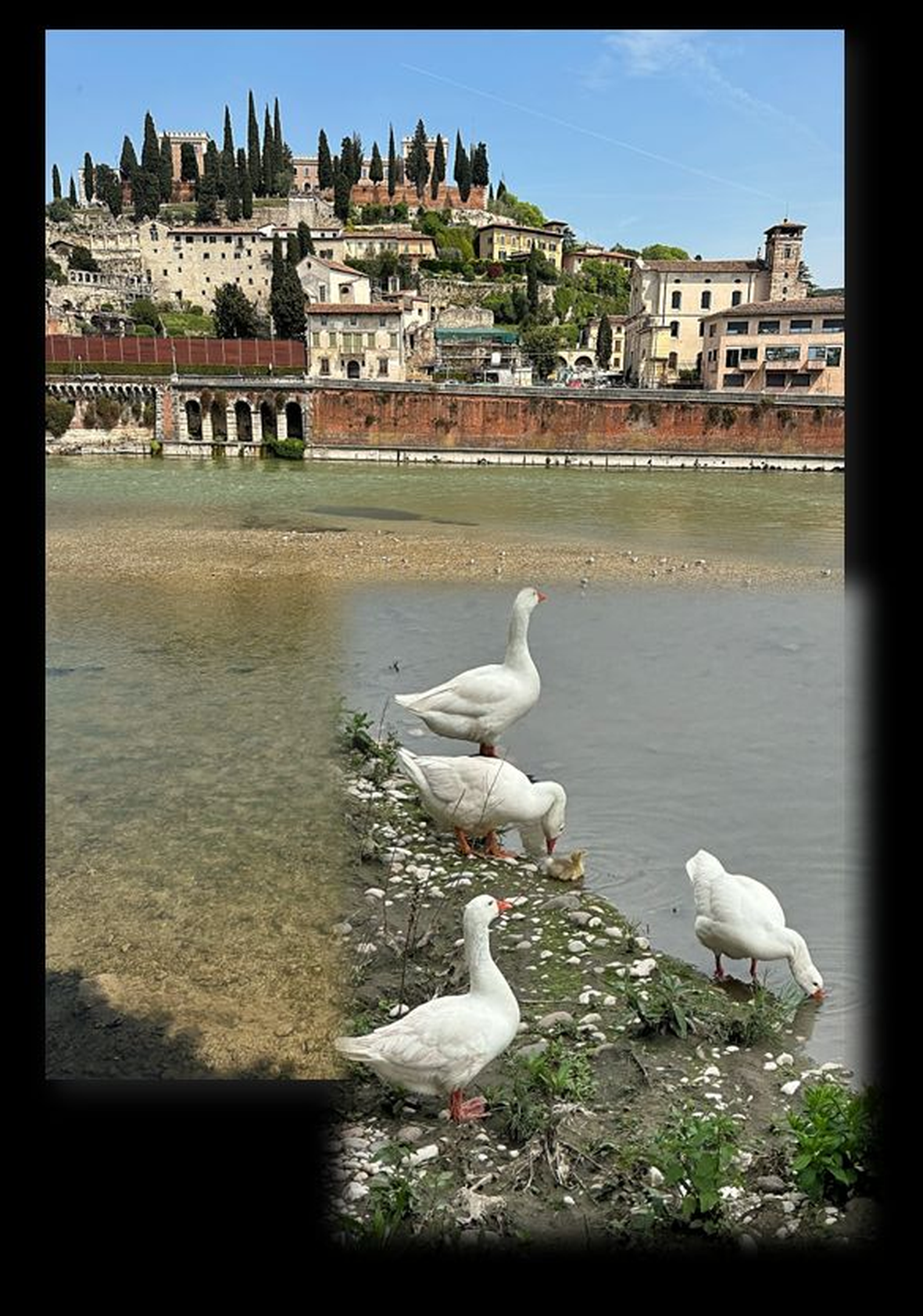
Floating in the current are seagulls and a lone, irresistibly plush gosling, watched over closely by four adult geese. Past lovingly designed shop windows with beautiful quilts like at Terra Crea (where I buy some great handmade earrings!), Carbaline, Liberia Mondadori and many more - unfortunately the windows reflect too much for good photos with our cell phone camera, but you can see a little bit of the textile works that invite you to the Verona tessile...
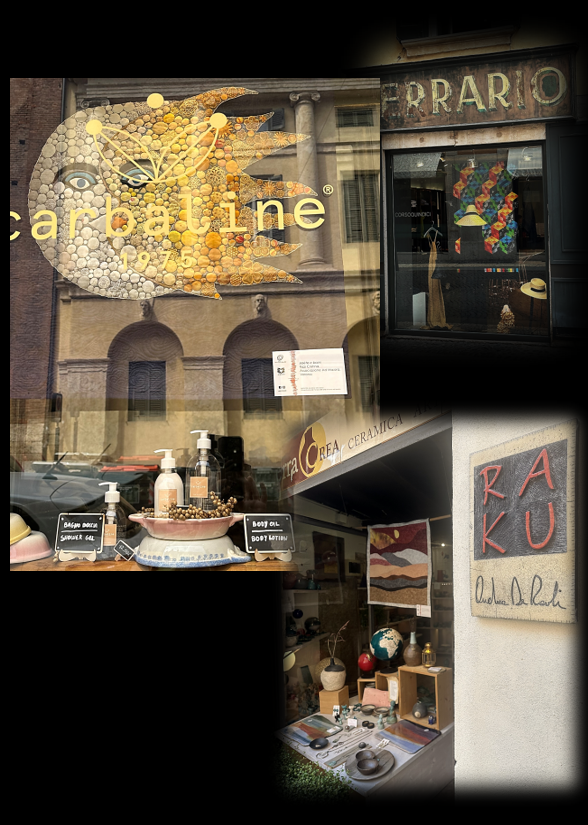
From April 30th, 2 days after our arrival, the palazzos, museums and churches decorated with textile works of art are open to visitors. For us, unfortunately, the only exhibition day with too many locations to conquer them in just one day (we, or rather I'm not that young and fit to run anymore!). But the exhibits we see are magnificent and admirable: textile works of art from all over the world on a wide variety of themes that tell stories or impress with colors and structures. You have to look at many things both from a distance and up close, photographs do not come close to doing justice to the personal impression. I always regret that I don't speak Italian, because hardly anyone speaks English well, so there are minor and major, sometimes amusing, misunderstandings in everyday challenges such as ordering food, finding the right palazzo where my work is exhibited, at the opening ceremony with some speeches, which we unfortunately cannot understand, and the supposed piano concert “piano nobile”, which turns out to be the name of the floor, and which in reality is followed by a small, cozy drink with a buffet in the “Palazzo Die Mutilati”!
The presentation of the works for “Fearless female artists in history” is also here in the dreamlike, historical ambience and I find my work about Camille wonderfully illuminated between many, very different, artistic textile works. It's quite astonishing, because apart from a joint theme work by several artists, apparently nobody chose the same personality! I meet Teresa, the president of the Associazione ad Maiora, a petite little Italian lady who gives me a warm welcome. The evening ends with a glass of wine and a last round trip through Verona by taxi back to the lovingly run bed & breakfast “La magia die Sogni”, located on the outskirts of Verona between vineyards and rural houses. We pack our bags quickly... Departure from sunny and warm Italy at 4.30 a.m., after a night much too short - tired and enriched with many wonderful impressions that I will cherish for a long time Ciao Verona - Ciao bella Italy! The “Verona tessile” event can be visited until May 3rd, my textile work will travel back to Austria by post — but Camille will accompany me for a longer time in Anne Delbée’s book “The Kiss, Art and Life of Camille Claudel”, which I read now and then when I find some time in between, and in “Camille Claudel, a life in stone” by Barbara Krause, which is still promising and unopened on the living room table, waiting for me. And yes, who knows, maybe it will still happen and one day I will follow in her footsteps to Champagne or another promising area of France and - who knows, maybe you can then read here in this blog how the journey will continue...